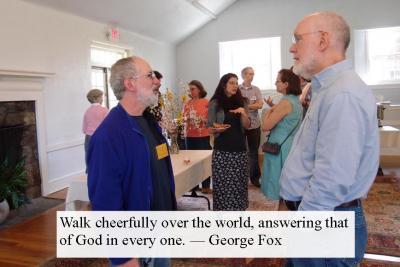
Quaker History
The Religious Society of Friends, also known as Quakers, grew out of the religious turbulence in England during the middle of the 17th century. Dissatisfied with the Church of England’s strict reliance on ceremony and formal creed, many individuals broke away to seek a more personal spirituality and direct relationship with God. George Fox emerged as a charismatic leader of growing group of seekers called the Religious Society of Friends, or Quakers. Many Quakers escaped English religious repression by emigrating, and Pennsylvania was founded by Quaker William Penn in 1682. Quaker, originally a derogatory term, became widely used and eventually adopted by Friends themselves.
For more on Quaker history at the Philadelphia Yearly Meeting website, click here.
Quaker Beliefs
The core of Quaker spirituality is the belief, validated through experience, that everyone can have a direct relationship with the Divine. The Light Within is the fundamental experience of Quakers’ spiritual lives, and serves as a guide and beacon for actions in the world. Friends experience the Light Within by attending sensitively to their own inner prompting, and then testing this prompting in community with other Friends.
For more on Quaker beliefs at the Philadelphia Yearly Meeting website, click here and here.
The Testimonies
While specific aspects of Friends’ practices have varied throughout the centuries, many core concerns and values have remained consistent over time and demographic diversity. The Testimonies are deeply held beliefs and expressions of living in the world that have guided Quakers throughout history and remain a source of wisdom in Quakers’ lives today. In the past the testimonies were defined somewhat specifically, but today they are more broadly stated. The testimonies that are currently widely recognized as enduring expressions of the Inner Light are Simplicity, Equality, Peace, Tolerance, Community, Stewardship, and Integrity.
For more on Quaker Testimonies at the Philadelphia Yearly Meeting website, click here.
Quaker Practices
Meeting For Worship
Meeting for Worship is the heart of Quaker practice, and refers to the weekly prayerful gathering of the community. Generally Meeting for Worship begins in silence as Friends turn toward the Inner Light in expectant waiting. Friends arrive for Meeting for Worship with minds and hearts prepared, stilling any preoccupation with the involvements of daily life. Sometimes the entire hour passes without anyone speaking; more frequently one or more Friends rise, in turn, to share experiences of the Inner Light which have arisen within the silence. Each message is given and received with respect, without argument or debate. At the end of an hour of worship, Friends typically greet one another by shaking hands.
For more on Meeting for Worship at the Philadelphia Yearly Meeting website, click here.
Other Quaker practices
Links to more information about Quakerism
General
Philadelphia Yearly Meeting: Provides activities, publications, and resources for Friends and meetings in the Philadelphia area.
Faith and Practice of Philadelphia Yearly Meeting: Details beliefs and practices of Philadelphia-area Friends.
Friends General Conference: Offers services including publications and an annual gathering for Friends in U.S. and Canada.
Friends World Committee for Consultation: Encourages fellowship among Quakers throughout the world.
Peace and Social Concerns
American Friends Service Committee: Works for economic justice, peace-building and demilitarization, social justice, and youth.
Friends Committee on National Legislation: Lobbies U.S. government on peace and social justice issues.
Earth Quaker Action Team (EQAT): Uses nonviolent, public actions to work for an end to mountaintop removal mining of coal.
Quaker United Nations Office: Represents Friends’ concerns at the U.N. in New York City and Geneva.
Right Sharing of World Resources: Independent Quaker organization that supports economic development microprojects in the Third World.
Friends Peace Teams: Promotes healing and reconciliation within conflict-torn communities in Latin America, Africa, and Asia.
Nonviolent Peaceforce: Quaker-led organization provides unarmed civilian peacekeeping teams in areas of conflict.
Education
For a list of Philadelphia-area Friends schools on the Philadelphia Yearly Meeting web site, click here.
The Arts
Fellowship of Quakers in the Arts: Nurtures the literary, visual, musical, and performing arts within the Religious Society of Friends, for purposes of Quaker expression, ministry, witness, and outreach.
Other resources
Pendle Hill: Quaker study and retreat center near Swarthmore.
Friends Journal: Monthly magazine devoted to Quaker life, practice, and issues.
Quaker Information Center: Broad range of Quakerism information from the Earlham School of Religion, a Christian graduate theological school in the Quaker tradition.
Quaker.org: Independent website, maintained by a Quaker, with hundreds of links to information including writings of Friends and Quaker-run businesses.